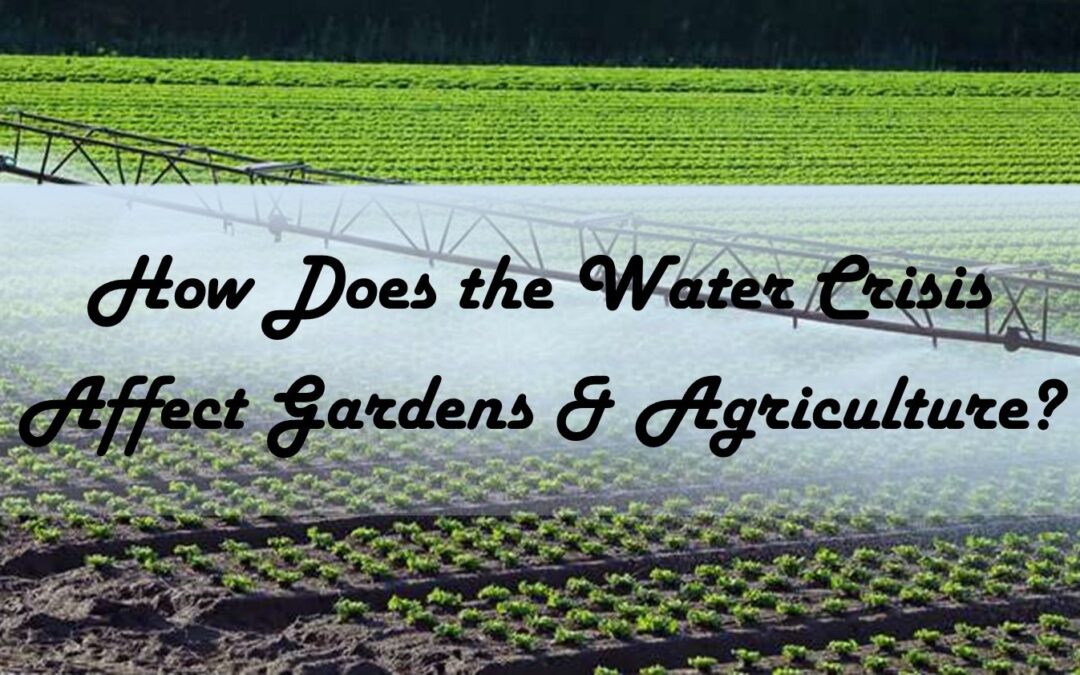Written by: Alessia Carpino
Introduction:
Water. One of, if not the most, important resources on our planet, plays a vital role in every living creature’s existence. This natural resource is quickly disappearing on a global scale which will greatly affect gardens and agriculture.
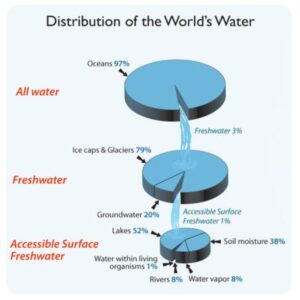
Diagram explaining the distribution of Earth’s water.
The breakdown of Earth’s water supply:
The water crisis is, unfortunately, not an issue that many people realize the severity of. Some people may wonder if Earth is dominantly made up of water, specifically 71%, then shouldn’t that be enough? Well, this problem that we face daily isn’t due to a lack of overall supply. The problem is the amount of water we can actually use. Here’s a quick breakdown of the world’s water supply.
97% of Earth’s water is saltwater that makes up our oceans. This water is filled with a vast amount of minerals that make this water undrinkable for humans and unusable in agriculture. With only 3% of freshwater that’s accessible for our needs, more than ⅔ of this water is frozen in glaciers. That leaves all the plants, animals and 7.8 billion people of our world to use less than 1% of Earth’s accessible freshwater for all of our daily needs.
This shocking news becomes even more unfortunate when recognizing that many people across the globe don’t have equitable amounts of water supply. Water is a renewable resource because of the water cycle. Even though this essential natural resource is being restored, humans are depleting our limited water supply faster than it can be replenished.
The water crisis and agriculture:
The water crisis is extremely damaging to agriculture considering all plants and animals depend on water for their survival. If there is no water for the crops or livestock, they will sadly die. The process of photosynthesis would not occur without plants and there would be no food for our population. Despite the water crisis negatively affecting agriculture, this industry is the leading cause of water scarcity throughout our planet. Agriculture accounts for 37% of Earth’s land area, but consumes 92% of our water consumption! This enormous percentage of freshwater is being depleted by crops and livestock to feed our increasing population. How can we help the agriculture industry continue to thrive while stopping it from threatening our globe’s freshwater supply?
Ways to conserve water in agriculture:
There are many solutions to this dilemma, two of which would work efficiently together to conserve water for agriculture. Farmers can grow more drought-tolerant crops and collect rainwater using rain barrels. The rainwater collected from these rain barrels will be used less for the crops since they can survive long periods of time without water. This rainwater will be used for crop irrigation.
Speaking of crop irrigation, using drip irrigation systems to water your crops can decrease evaporation while saving up to 80% more water. Decreasing evaporation is beneficial because the more water that’s in the air, the more intense rainfall events are. This could lead to dangerous floods, negatively impacting the environment and human health. Drip irrigation also ensures that the water travels directly to the plants’ roots which leads to better and healthier growth.
Finally, farmers can center their attention on better soil quality to hold the moisture and oxygen in the soil for their plants to thrive. By adding compost, fertilizing with manure and maintaining the soil, farmers will be decreasing the crops’ daily water usage. By adapting these and many more solutions to the agricultural industry, we are making an exceedingly great change for the water crisis to improve the lives of everyone and everything!
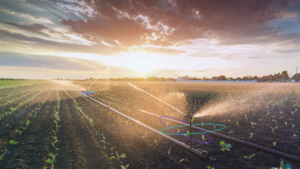
Better drip irrigation watering systems help the water crisis.
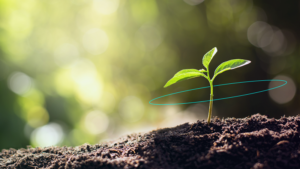
Good soil quality will save the daily water usage of plants.
Drought-tolerant crops vs non-drought-tolerant crops:
Drought-tolerant crops are favourable in comparison to crops like wheat and canola. These crops are becoming extremely expensive ever since they were hit hard by the scorching humidity in Western Canada and the United States. These non-drought tolerant crops are suffering from these extreme heatwaves while damaging our water crisis to a greater extent. Drought-tolerant crops, on the other hand, are not only good for the environment but helpful for your budget.
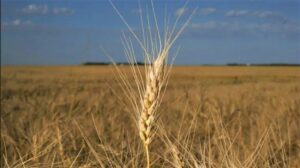
Non-drought-tolerant crops like wheat and canola are being affected during extreme weather conditions.
How can you make a difference to help conserve household water:
Agriculture is a significant factor in our growing water scarcity crisis, but we also have to make an effort to save water throughout our households. Some simple yet necessary actions you can take to save water throughout your household include:
- Don’t leave the water running from your taps when you aren’t using them.
- Use a broom instead of a hose to clean your back or front yard.
- Don’t use your toilet as a waste bin.
- Water your lawn only when necessary.
- Connect sensors to your appliances that consume water such as a faucet or sprinkler to track how much water it’s using. You can then adjust your habits to prevent unnecessary water usage.
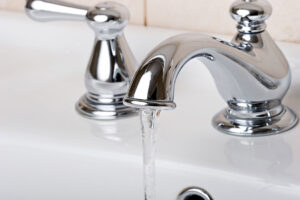
Running water is wasted when not in use.
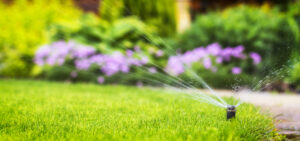
Sprinkler running in a garden.
Conclusion:
Unfortunately, we are rapidly consuming our accessible freshwater at an unsustainable pace. This crisis should not be taken lightly. We cannot lose our remaining water that’s essential to sustain life on Earth. We all have to do our part to conserve water so we can have a brighter future. We can end water scarcity if we work together as one united community. Let’s all save one drop at a time and save our planet!
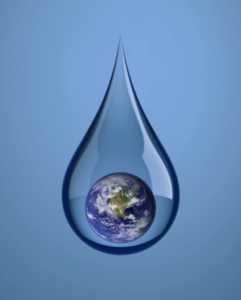
This image of Earth in a single drop of water represents how the world cannot live without water and why every drop counts. (Created by: Alessia Carpino)
Information Sources:
https://www.youtube.com/watch?v=OCzYdNSJF-k
https://thewaterproject.org/water-scarcity/water-scarcity-and-agriculture
https://www.sigfox.com/en/news/8-tips-agricultural-water-conservation
https://scied.ucar.edu/learning-zone/climate-change-impacts/water-cycle-climate-change
https://www.water.ie/conservation/conserve/?tip=farm#content
https://www.cbc.ca/news/business/canola-wheat-heat-1.6084492
Image Sources:
https://www.sigfox.com/sites/default/files/inline-images/waterc3.png
https://www.sigfox.com/sites/default/files/inline-images/water-c7.pngural-water-conservation
https://www.realtylandscaping.com/wp-content/uploads/2019/05/lawn-watering-1024×480.jpg
https://seeds.ca/schoolfoodgardens/wp-content/uploads/2021/07/Raindrop-Earth-Image-Information-Page-One-Drop-App.png – Image created by Alessia Carpino
https://cdn.britannica.com/80/102480-050-98F06900/Lettuce-field-irrigation-sprinklers.jpg
https://seeds.ca/schoolfoodgardens/wp-content/uploads/2021/07/How-Does-the-Water-Crisis-Affect-Gardens-and-Agriculture-Featured-Image-1080×675.jpg – Image created by Alessia Carpino

